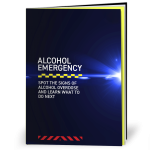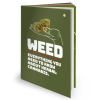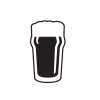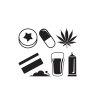Alcohol poisoning: signs, symptoms and when to get help.
Are they drunk or dangerously intoxicated? When should you get them to the hospital? This alcohol poisoning guide will explain what to do and when to do it.
- What is alcohol poisoning?
- What are the early signs of alcohol poisoning?
- What do we mean by alcohol building up to dangerous levels?
- This is how alcohol builds up in the body
- When to get help
- How to help someone with alcohol poisoning
- What to expect in hospital
- How alcohol affects your brain and behaviour
- Mixing alcohol with other drugs
- Safer drinking tips
- Share this information
- Further alcohol support and information
What is alcohol poisoning?
Alcohol poisoning is a serious condition that happens when you drink too much alcohol in a short time. Your body can't process it fast enough, so alcohol builds up to dangerous levels and starts to affect vital functions like:
- Breathing
- Heartbeat
- Keeping body temperature steady
- The gag reflex (which stops someone from choking)
What are the early signs of alcohol poisoning?
- Confusion or trouble staying awake
- Vomiting
- Clammy skin
- Slow heart rate and breathing
Alcohol poisoning is a medical emergency. It can lead to brain damage or death if you don't get help. If you're with someone who needs help call 999 straight away and stay with them until help arrives.
↑ Back to topWhat do we mean by alcohol building up to dangerous levels?
You build up alcohol in your body when you drink more than your body can process. The strength of a drink is measured in units of alcohol. Your liver can break down about 1 unit per hour. If you drink too quickly, alcohol builds up in your blood. This can lead to alcohol poisoning — even after you've stopped drinking — because your body is still absorbing alcohol it hasn't processed yet.
Different drinks contain different amounts of alcohol. Here are some common examples:
- A single shot of spirits (25ml at 40%) = 1 unit
- A small glass of wine (125ml at 12%) = 1.5 units
- A pint of strong beer or cider (568ml at 5%) = about 2.8 units
This is how alcohol builds up in the body
A pint of strong beer or cider (around 5%) contains about 2.8 units. Since your liver processes about 1 unit per hour, it could take nearly 3 hours to break down fully.
Drink two pints (about 5.6 units) and it could take 5 to 6 hours to clear from your system. Three pints (8.4 units) could take over 8 hours.
Alcohol can build up quickly, especially if someone drinks several drinks close together. The body can't keep up — and that's when the risk of alcohol poisoning increases, even after drinking stops.
Everyone processes alcohol at different rates
How long it takes to break down alcohol varies from person to person, the unit time above is an average. It depends on body size, sex (women often feel the effects more quickly due to size and metabolism), age, how fast you drank, whether you've eaten (food slows down how quickly alcohol is absorbed into the bloodstream), and if you've used any other drugs.
↑ Back to topWhen to get help
This section provides a quick comparison to help determine whether someone requires urgent assistance.
Drunk
- The person appears relaxed, talkative or unsteady
- They may slur their speech or lose balance
Signs to watch for:
- Minor stumbling
- Slightly slower reactions
▸ No medical help is usually needed — just food, rest and time.
Dangerously intoxicated
- The person is drowsy, confused or behaving unusually
- They may vomit, fall, or pass out briefly, then wake up
- Difficulty walking in a straight line
- Confusion about where they are
- Vomiting more than once
▸ They should not be left alone and may need monitoring.
Alcohol poisoning
Even one serious symptom could mean alcohol poisoning. If someone shows any of the signs below, call 999 immediately.
- The person may be unconscious, breathing slowly or irregularly
- Have pale or blue skin, or experience seizures
Signs to watch for:
- Cannot be roused by shouting their name or light shaking
- No response to touch, sound, or movement
▸ This is life-threatening — call 999 immediately
Alert
If someone seems "just drunk", they could quickly become dangerously intoxicated or experience alcohol poisoning. These stages can change rapidly — check on them regularly, and if unsure whether it's an emergency, call NHS 111 for advice, call 999, or take the person to hospital.
How to help someone with alcohol poisoning
Do:
- Stay with the person
- Sit them up if they are awake (preferably on the floor)
- If unconscious, place them in the recovery position (on their side with one ear to the ground)
- Check their breathing
- If they can swallow, offer small sips of water
- Keep them warm with a jacket or blanket
Don't:
- Don't give more alcohol
- Don't offer coffee or caffeinated drinks
- Don't walk them around — they could fall
- Don't put them in a cold shower or bath — risk of shock or unconsciousness
- Don't try to make them vomit — they could choke
What to expect in hospital
If someone is taken to A&E for alcohol poisoning, hospital staff will follow a standard process. This may vary slightly between hospitals but generally includes the steps below.
Triage assessment
A nurse or healthcare worker will assess how serious the situation is and prioritise care accordingly.
Medical assessment
A doctor will examine the person, order any necessary tests, and decide on appropriate treatment.
Monitoring and treatment
Vital signs such as breathing, heart rate and temperature will be closely monitored. The person may receive fluids, medication or care for alcohol withdrawal symptoms.
Support and advice
Hospital staff may offer information on alcohol risks, safer drinking, and referrals to support services.
Referral or discharge
Depending on their condition, the person may stay for observation or be sent home with follow-up advice or support referrals.
↑ Back to topHow alcohol affects your brain and behaviour
When you drink, alcohol goes into your bloodstream and heads straight for your brain, changing how you feel and behave. It affects neurotransmitters like dopamine and serotonin, which make you feel good and encourage more drinking. It also affects GABA and glutamate, which regulate brain activity and keep you safe.
How alcohol changes your brain
Quick drinking causes levels to rise fast, increasing the risk of overdose. Women often experience effects more quickly due to body size and metabolism differences.
Common behaviour changes when drinking
- Violence: Alcohol affects judgment and restraint, making aggression more likely
- Slurred speech: Impaired muscle control leads to slurring and slower reaction times
- Trips and falls: Alcohol slows coordination and balance, increasing injury risk
- Risky sex: Lower inhibitions and poor judgment can increase unsafe sex or difficulty with consent
- Sleepiness: Alcohol is a central nervous system depressant, making you sleepy but disrupting sleep quality
- Blackouts: Drinking heavily can block memory formation in the hippocampus, causing gaps or total amnesia
Mixing alcohol with other drugs
Mixing alcohol with drugs is dangerous. Both pass through the liver, increasing harmful effects and creating toxic substances. It also increases overdose risk.
Stimulants
Cocaine, speed, ecstasy, mephedrone: These speed up heart rate while alcohol slows it down. Mixing them puts your heart and brain under extreme pressure. Alcohol with cocaine produces cocaethylene, which increases heart attack or stroke risk.
Depressants
- GHB, GBL: Both cause sleepiness and loss of consciousness. Combined with alcohol, the risk of coma or death rises sharply.
- Heroin, opioids: Powerful sedatives. Mixing even small amounts with alcohol can lead to fatal overdose.
- Spice/synthetic cannabinoids: Very potent, unpredictable depressants. Mixing with alcohol increases overdose risk.
Prescription medicines
- Antidepressants: Alcohol can worsen side effects and make you feel more depressed. With MAOIs it can dangerously raise blood pressure.
- Tranquilisers: Medicines like diazepam, temazepam and lorazepam slow breathing and heart rate. Mixing with alcohol can be deadly.
Safer drinking tips
These tips can help reduce the chances of drinking leading to an emergency.
Before you go out
- Eat beforehand to help absorb alcohol. Set a limit on how much you'll drink.
- Be careful with pre-drinking (or "pre-loading") — drinking a lot before going out can mean you start the night at a higher risk level and may lose track of how much you've had.
While you're drinking
- Alternate with water or soft drinks to stay hydrated.
- Avoid rounds to control your intake. Miss a round or choose low-alcohol options.
- Drink slowly to give your body time to deal with the alcohol. The slower you drink, the easier it is for your liver to keep up and reduce the risk of alcohol building to dangerous levels.
- Put your drink down between sips — if you hold your drink the whole time, you're more likely to drink faster without realising.
Know your drink's strength
Different drinks have different amounts of alcohol. You can check the label for the ABV (alcohol by volume) — this tells you what percentage of the drink is pure alcohol. The higher the number, the stronger the drink.
Your body can only process about one unit of alcohol per hour. If you drink too quickly, alcohol builds up in your system, which increases the risk of harm.
There's now a wide range of low and no alcohol drinks, including beers, wines, and spirits. In the UK, drinks with 1.2% ABV or less are classed as low alcohol, and drinks with 0.5% or less are often called alcohol-free.
↑ Back to topShare this information
Raising awareness and sharing accurate information are effective ways to reduce harm. Services can order our alcohol overdose resource for people who drink or those who need to know how to respond to alcohol poisoning, or share this guide with anyone who needs a clearer understanding of the risks and effects.
↑ Back to topFurther alcohol support and information
NHS Alcohol Poisoning Information
What alcohol poisoning is, the symptoms, and when to get help
www.nhs.uk/conditions/alcohol-poisoning
Drinkline
Free, confidential helpline
📞 0300 123 1110 (Weekdays 9am–8pm, Weekends 11am–4pm)
www.drinkaware.co.uk/alcohol-support-services
Talk to Frank
24-hour drug advice for young people and parents
📞 0800 77 66 00
www.talktofrank.com
NHS 111
For urgent medical advice when you're not sure what to do
www.111.nhs.uk


















